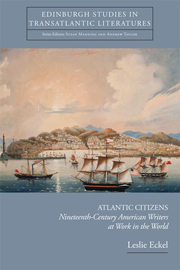Book contents
- Frontmatter
- Contents
- Acknowledgements
- Dedication
- Introduction: The Vocational Routes of American Literature
- 1 Longfellow and the Volume of the World
- 2 Fuller's Conversational Journalism: New York, London, Rome
- 3 ‘A type of his countrymen’: Douglass and Transatlantic Print Culture
- 4 Between Cosmos and Cosmopolis: Emerson's National Criticism
- 5 The Professional Pilgrim: Greenwood Sells the Transatlantic Experience
- 6 Standing Upon America: Whitman and the Profession of National Poetry
- Afterword: Vocation or Vacation? Transatlantic Professionalism Now
- Notes
- Bibliography
- Index
1 - Longfellow and the Volume of the World
Published online by Cambridge University Press: 05 September 2013
- Frontmatter
- Contents
- Acknowledgements
- Dedication
- Introduction: The Vocational Routes of American Literature
- 1 Longfellow and the Volume of the World
- 2 Fuller's Conversational Journalism: New York, London, Rome
- 3 ‘A type of his countrymen’: Douglass and Transatlantic Print Culture
- 4 Between Cosmos and Cosmopolis: Emerson's National Criticism
- 5 The Professional Pilgrim: Greenwood Sells the Transatlantic Experience
- 6 Standing Upon America: Whitman and the Profession of National Poetry
- Afterword: Vocation or Vacation? Transatlantic Professionalism Now
- Notes
- Bibliography
- Index
Summary
I said with the Cosmopolite, ‘The world is a kind of book, in which he, who has seen his own country only, has read but one page.’
Longfellow, ‘The Schoolmaster’I saw that in its depth far down is lying,
Bound up with love together in one volume,
What through the universe in leaves is scattered;
Substance, and accident, and their operations,
All interfused together in such wise
That what I speak of is one simple light.
Dante, Paradiso XXXIII, 85–90 (tr. Longfellow)In one of the most memorable episodes of modernist condescension to a Victorian predecessor, Ludwig Lewisohn spat, ‘Who, except wretched schoolchildren, now reads Longfellow?’ Lewisohn himself may have faded from view, but his impression of Longfellow as a ‘schoolroom poet’, fit solely for the gentle moral instruction of the young rather than the edification of those who know better, remains ours today. Longfellow's didacticism is now accepted fact, and most critics see it as an obstacle to the serious academic study of his poetry. Edward Wagenknecht has observed, ‘Neither Longfellow's “sentimentalism” nor his didacticism is a very profitable subject for discussion now, for the modern rebellion against both these tendencies in literature is too recent to permit us to approach the subject dispassionately.’ By trying to protect Longfellow from the charges of thinking like a teacher, Wagenknecht actually hides from view one of the most significant forces that shaped Longfellow's writing from his earliest essays in the 1830s to his late masterwork, his translation of Dante's Divine Comedy: a desire to provide a cosmopolitan education for his readers.
- Type
- Chapter
- Information
- Atlantic CitizensNineteenth-Century American Writers at Work in the World, pp. 19 - 45Publisher: Edinburgh University PressPrint publication year: 2013



